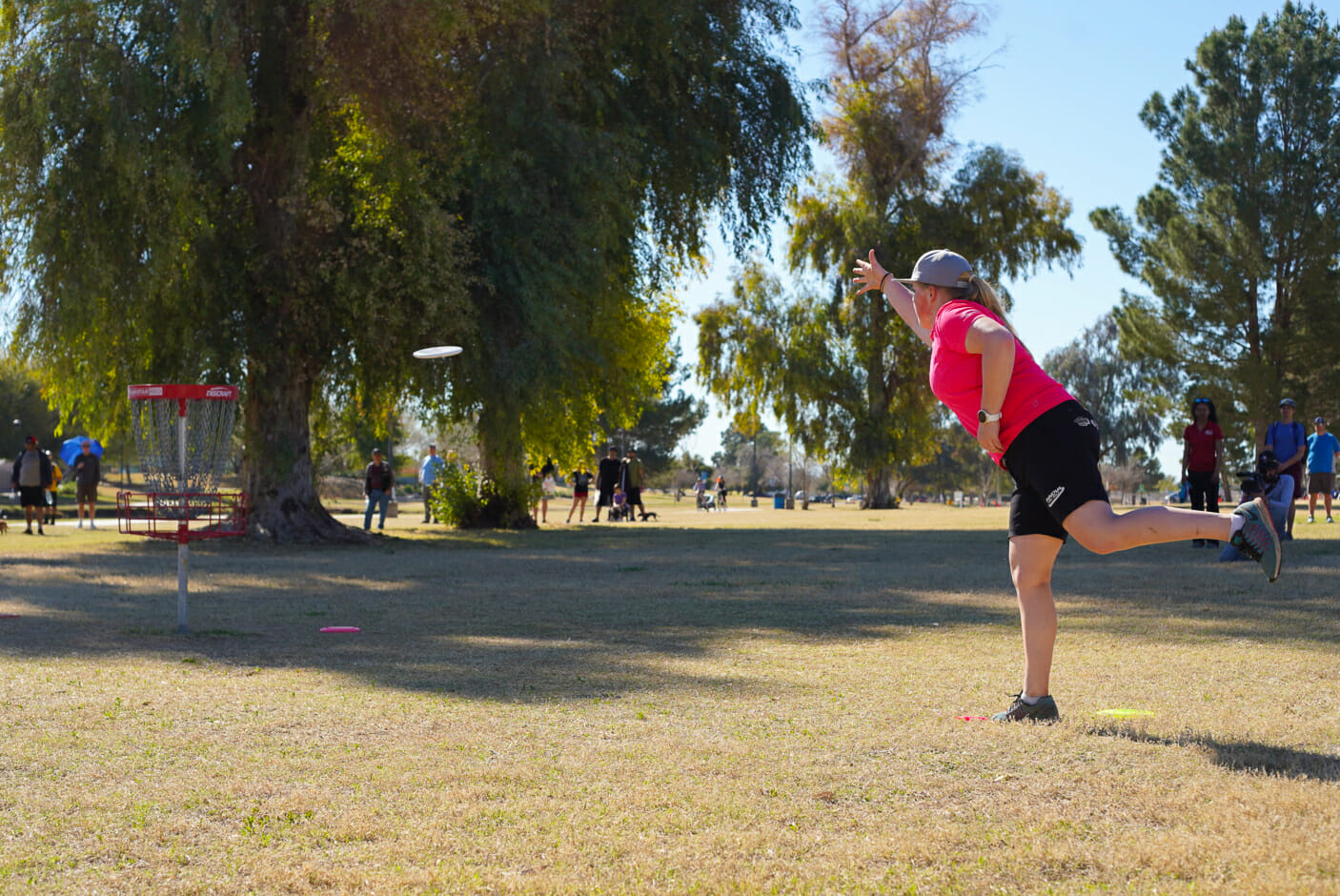Eveliina Salonen Is Not a Bad Putter
An analysis of Salonen’s form and recent putting woes
March 24, 2022 by Patrick Aubyrn in Analysis with comments
Eveliina Salonen might be the best tee-to-green player in the game. Watching her mash on a driver is thrilling. Her throwing form is powerful and athletic, and she is an expert shot shaper with an ability to throw with great finesse both backhand and forehand. Salonen is also a midrange technician; her approach shots are deliberate and controlled. When you see her play, you can’t help but marvel at her precision.
The stat sheet backs up the eye test: Salonen leads the tour in parked percentage and circle 1 in regulation and ranks second in fairway hits, third in C2 in regulation, and fifth in scramble percentage.
However, Eveliina Salonen is struggling mightily on the green, and her poor putting has offset her throwing prowess of late.
At the Las Vegas Challenge, she only converted 51% of her C1X putts (18/35) and 5% of her C2 putts (1/19). At the Waco Annual Charity Open, she converted an abysmal 17% (5/29) of her C1X putts and 0% (0/12) of her C2 putts. Her early season averages across those seven rounds—36% C1X putting (23/64) and 3% C2 putting (1/31)—rank her last among touring professionals.
The stark difference between throwing and putting is perhaps best demonstrated by strokes gained and lost at WACO. Salonen led the field with 23.39 strokes gained tee to green—9 points better than Valerie Mandujano, 13 better than Kristin Tattar, and 16 better than Catrina Allen—but she lost 13.99 strokes putting, which ranked dead last for the tournament by 5 strokes.
But let’s set the record straight: Eveliina Salonen is not a bad putter.
According to the available UDisc and Metrix Statistics from 2019-2021, Salonen averaged 66% C1X putting (358/543) and 7% C2 putting (22/281) during that three-year span. Neither of those numbers is stellar, but they are significantly better than her 2022 averages thus far. Compared to the field writ large, her three-year average ranks in the middle of the pack. Only 9 percentage points separated the tenth best C1X putter on tour in 2021 (73%) from the 40th (64%).
Notably, Salonen has been remarkably consistent over the aforementioned three-year span as well. Here is how her numbers break down on a year-to-year basis1 —
- 2019 (18 rounds) – C1X: 90/132 (68%), C2: 12/100 (12%)
- 2020 (17 rounds) – C1X: 97/155 (63%); C2: 6/52 (12%)
- 2021 (23 rounds) – C1X: 171/256 (67%), C2: 4/129 (3%)
In 2022, Salonen is missing nearly 50% more putts per round from C1X when compared to the previous three years. In an attempt to diagnose the problem, I went back and watched all of the available tournament footage of Salonen from 2021 and 2022. What was the tale of the tape? Would an in-depth film analysis allow me to hypothesize what accounts for the dip in her percentages?
Avid fans of the women’s game followed the European tournaments closely in 2021, especially the Prodigy Disc Pro Tour (PDPT) in Finland and the European Disc Golf Championship (EDGC). One event stands out as the tipping point that precipitated her current struggle: a disastrous five-putt triple bogey on the 18th hole to end her third round at the EDGC:
Eveliina Round 3 EDGC 2021 Five-Putt
Salonen was unbeaten (4/4) on the PDPT heading into the EDGC and led the continental championship by nine strokes heading into the 18th hole on Saturday. In that moment, she gave up four strokes to Henna Blomroos, the eventual winner, but more unfortunately, her experience on the 18th green clearly shook her confidence, and she turned in her worst performance of the season to date on the green the next day, carding five two-putts and two three putts from inside the circle. She lost eight strokes to the field and twelve to Blomroos on the green on Sunday.
But the box score doesn’t tell the full story.
Rewind to the previous day. The 54th hole started out promising. Salonen hucked a midrange disc approximately 410 feet downhill, which left her 36 feet short of the pin. Putting toward the gallery, she whiffed wide right from C2, and her disc settled about 14 feet away. Salonen putts quickly, but this time she appeared to rush her routine and flung her attempt wide right at band height. Normally even keeled and genial on the course, Salonen was visibly angry with herself after missing this putt. For good reason. It was the third time that day she missed a putt from inside of 18 feet, and the second time in four holes that she pulled it wide right and missed the target entirely from inside of 20 feet.
Next, the unthinkable. Salonen missed her comebacker from 16 feet, barely drawing chains right, then splashed out right on the ensuing 15-footer. Watching the sequence in its entirety is excruciating.
These missed putts were shocking because Salonen had been money from 11-24 feet prior to August 13, 2021. In fact, through fourteen rounds encompassing the first four tournaments on the PDPT and the first two rounds of the EDGC, Salonen was on pace to have her best season on the green by a wide margin. Heading into moving day at the EDGC, she had converted 79% of her C1X putts (118/150), and the vast majority of her C1 misses in the previous four tournaments were in the 25-33 foot range.
Over the final nine rounds of her season, encompassing the last two rounds of the EDGC, the Finnish Championships, and the last stop on the PDPT, Salonen only converted 50% of her C1X putts (53/106), but it was really only the final round at the EDGC where she looked completely lost on the green.
Before attempting to assess what might be causing the prolonged dip in Salonen’s putting performance, we should break down her mechanics from the first half of the 2021 season when she was in peak form.
Salonen prefers a staggered stance, though she appears equally comfortable putting from a straddle. Regardless of stance, she first squares up the basket with her shoulders. At the top of her downswing, Salonen extends her right arm fully at about shoulder height. She grips her putter along its right rim with her thumb pointed at the target and her left hand lightly supporting the disc. From there, she simultaneously begins lowering the disc and loading her lower body. The longer the putt, the lower her crouch. Both hands support the disc at the beginning of its descent, but the left breaks away naturally before Salonen begins her throwing motion. She lets her right elbow soften as she draws the putter slightly toward her midsection.
Salonen begins her leg drive just before initiating the whip-like motion that characterizes her putt. It’s the same movement you might use to snap a towel. Her right elbow breaks out to the right side of her body as she cocks her wrist. At the same time, she begins to rotate her torso slightly, pushing her right shoulder forward while her right elbow initiates the extension back toward the target. She typically releases the disc with a snap of the wrist and on a slight hyzer angle. When her timing really clicks, her putts come out with a slight wobble but good velocity and a relatively direct trajectory, not breaking much above band height.
Here are some examples:
Eveliina Putting, Front View
Eveliina Putting, Side View
In other words, Salonen’s default putting stroke is fundamentally sound. When she was struggling in the second half of 2021, it looked like her timing and release point were slightly off, but her form remained otherwise consistent compared to the first half of the season.
So what’s different in 2022?
Based on my analysis of footage from the Las Vegas Challenge, the Memorial, and the Waco Annual Charity Open, I have noticed the following tendencies:
Salonen lobs the disc a bit more now than she did historically, especially on longer putts. It appears as though she is trying to drop the disc into the basket rather than putting it through the chains. Perhaps on account of the loftier toss, her putter often flies on a steeper hyzer angle as well.
Compare this birdie putt from the third round of 2022 WACO:
Eveliina WACO Miss
To this birdie putt from the third round of 2021 Turku:
Eveliina Turku Make
She alternates more frequently between stagger and straddle stances, seeming to prefer the latter, and it looks as though she is engaging her lower body less, though this could be an intentional move to economize motion. More crucially, the timing between lower and upper body looks slightly off. Compare this missed birdie putt at the 2022 LVC:
Eveliina LVC Miss
To this par putt from the 2021 Turku:
Eveliina Turku Make #2
At WACO, Salonen putted with Innova Aviars instead of Discmania P-Line P2s. The classic Aviar is most similar to the P2 in shape but would be an unusual choice for a windy weekend because it is a more neutral flier. The Aviar driver is more overstable than a P2 but feels considerably different in-hand owing to its big bead. Notably, she has been using a P2 for the past five years since 2017, perhaps longer, and neither of the putters she used at WACO were featured in her bag check video from March 11.2
Overall, I would characterize her putting stroke and its results in 2022 as inconsistent. For every putt that dies to the left, glancing off the chains or the cage, she will drill one in the heart of the basket. Sometimes it clicks, like during the first round of the Memorial, and sometimes it doesn’t, like at WACO.
Some pundits have suggested that she should start over from scratch. I disagree. Salonen is a consummate champion in the midst of a putting slump. In my opinion, she needs to rediscover her form from the beginning of the 2021 season when she was converting 79% of her C1X putts. Recommit to the stagger stance, engage the legs more, throw on a lower trajectory with more velocity, and put the P2s…ahem, Infinite Alpacas…back in the bag.





